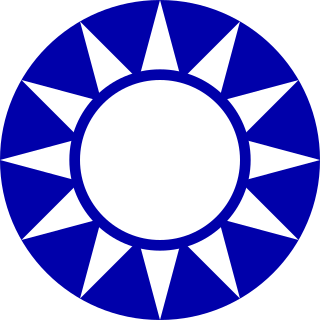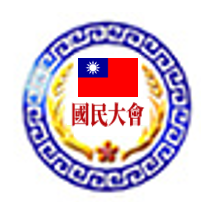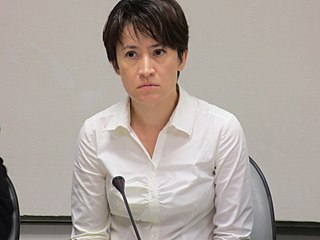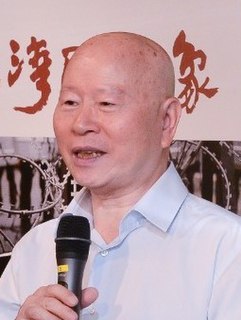
The Democratic Progressive Party (DPP) is a Taiwanese nationalist and centre-left political party in Taiwan. Controlling both the Taiwan Presidency and the unicameral Legislative Yuan, it is the majority ruling party and the dominant party in the Pan-Green Coalition.

The Kuomintang of China (KMT), also often alternatively translated as the Chinese Nationalist Party (CNP), is a major political party in the Republic of China based in Taipei. Formed in 1919, the KMT was formerly the sole ruling party of the Republic of China from 1928 to 2000 and is currently an opposition political party in the Legislative Yuan.

The politics of the Republic of China take place in a framework of a representative democratic republic, whereby the President is head of state and the Premier is head of government, and of a multi-party system. Executive power is exercised by the government. Legislative power is vested in primarily with the parliament and limited by government. The Judiciary is independent of the executive and the legislature. The party system is dominated by the Kuomintang, which favors closer links to mainland China, and the Democratic Progressive Party, which favors Taiwanese independence.

The President of the Republic of China is the head of state of the Republic of China. Since 1996, the President is directly elected by plurality voting to a four-year term, with at most one re-election. The incumbent, Tsai Ing-wen, succeeded Ma Ying-jeou on 20 May 2016 as the first female president in the state's history. Originally established in Nanking in 1912, the government and its president relocated to Taipei in 1949 after losing the Chinese Civil War.

The Legislative Yuan is the unicameral legislature of the Republic of China now based in Taiwan. It is one of the five branches of government stipulated by the Constitution of the Republic of China, which follows Sun Yat-sen's Three Principles of the People.

The National Assembly were several national parliamentary government organizations of the Republic of China, now commonly known as Taiwan.

During the National Constituent Assembly session on December 25, 1946 in Nanjing, the fifth and current Chinese constitution, known as the Constitution of the Republic of China, was ratified by the Kuomintang and adopted on December 25, 1947. Since 1949, the constitution, along with its Additional Articles, remains effective in ROC-controlled territories.

The Tangwai movement, simply Tangwai, was a political movement in the Republic of China (Taiwan) in the mid-1970s and early 1980s. Although the Kuomintang (KMT) had allowed contested elections for a small number of seats in Legislative Yuan, opposition parties were still forbidden. As a result, many opponents of the KMT, officially classified as independents, ran and were elected as members "outside the party."

This is a timeline of the Republic of China.

Hsiao Bi-khim is a Taiwanese politician and member of the Legislative Yuan. Born in Kobe, Japan, Hsiao grew up in Tainan, Taiwan before moving to the United States. She graduated from Oberlin College in 1993 and Columbia University in 1995.

The People's Republic of China (PRC) claims the island of Taiwan to be part its territory under its Constitution as the Taiwan Province. In combination with the Republic of China-controlled Fujian islands, it is usually referred to by mainland media as the Taiwan Region or Taiwan Area.

The Election for the 4th Legislative Yuan were held in Taiwan on 5 December 1998. The result was a victory for the Kuomintang, which won 123 of the 225 seats. Voter turnout was 68.1%.
The first supplementary elections took place for the National Assembly and the Legislative Yuan in the Republic of China on 20 December 1969. Voter turnout was 54.7% and 55.0% respectively.
The second supplementary elections took place for the National Assembly and Legislative Yuan of the Republic of China (Taiwan) on 23 December 1972.
The fourth supplementary elections for the National Assembly and Legislative Yuan were held in the Republic of China (Taiwan) on 6 December 1980.
The fifth supplementary elections for the Legislative Yuan were held in the Republic of China (Taiwan) on 3 December 1983.
The sixth supplementary elections for the National Assembly and Legislative Yuan were held in the Republic of China (Taiwan) on 6 December 1986.
The seventh and final supplementary elections for the Legislative Yuan were held in the Republic of China (Taiwan) on 3 December 1989.

The Elections for the 2nd Legislative Yuan were held in Taiwan on 19 December 1992.

The National People's Congress is the highest organ of state power and the national legislature of the People's Republic of China. With 2,980 members in 2018, it is the largest parliamentary body in the world. The National People's Congress meets in full session for roughly two weeks each year and votes on important pieces of legislation. Members are considered to be part-time legislators and are not paid to serve in the NPC.












